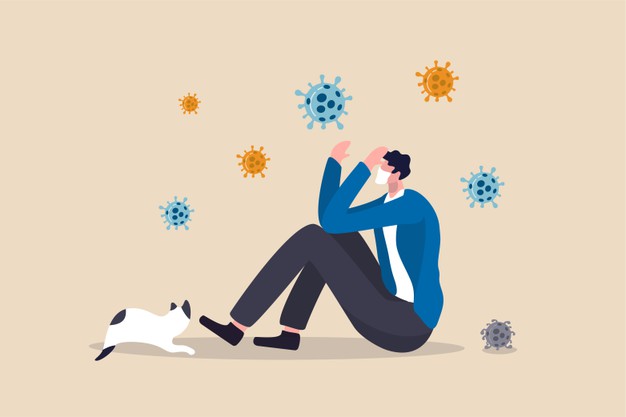
Study Shows Mindfulness Training Reduces Severity of Symptoms of Irritable Bowel Syndrome in Women
December 14, 2020
Victims of Workplace Bullying at Increased Risk of Depression and Cardiovascular Disease
January 1, 2021Since early 2020 people around the globe have encountered novel corona virus and its mysteries are still unfolding. Corona virus disease 2019 (COVID-19) is a viral ailment caused by Severe Acute Respiratory Syndrome Corona Virus 2 (SARS-CoV-2).
[SARS-CoV-2 is a single stranded RNA (ribonucleic acid) virus which can enter cells with the help of its spike proteins].
It usually takes 14 to 15 days for the symptoms of COVID-19 to appear. Most of the infected individuals develop mild to moderate illness but some may develop severe disease requiring hospitalization and may also need intensive care treatment.
During the pandemic, most of the people who developed symptoms of COVID-19 were able to resume their normal lives after a few days, but some of them have continued to suffer through symptoms of the disease weeks or even months following the infection. It seems that the virus has the potential to cause an unusually long-lasting illness; and thus the situation seems unpredictable for both physicians and affected individuals with respect to variety and duration of its symptoms.
‘Long covid’ which is also called ‘chronic covid’ or long- haul covid, describes the long-term sequelae of corona virus disease 2019 that continue for weeks or even months beyond the initial illness. People struggling with long covid symptoms are not just the one who developed severe form of disease or required hospitalization or intensive care treatment and are now in recovery phase, but it has also been experienced by people who developed relatively mild infection.

Symptoms of long covid as reported by sufferers may include; extreme fatigue, breathlessness, chronic cough, joint pains, muscular pains, headaches, loss of sense of smell and taste, hearing or eyesight problems, skin rashes, diarrhea, reduced appetite etc.
Furthermore, mental health problems have also been reported such as depression, anxiety, sleep disturbances and brain fog (one has to struggle to think clearly) etc. People may also encounter severe health issues as a result of damage to heart, lungs, kidney and gut consequently from COVID-19. Other viral illness can also have long lasting effects which usually resolve after sometime, but unfortunately there is currently no way to predict how long will it take for long covid patients to recover.
Long covid severely affects one’s quality of life and it’s quite a worrying situation for the sufferers.
Recently a team of researchers from the University of Geneva (UNIGE), the University Hospitals of Geneva (HUG) and the General Health Directorate of the State of Geneva conducted studies with an objective to develop a better understanding of this phenomenon, and followed nearly 700 people who tested positive for SARS-CoV-2 but did not require hospitalization.
To conduct the studies a COVICARE program was setup that offered remote monitoring of the patients who can be followed on an outpatient basis. Scientists claim that the studies have enabled them to develop a better understanding of the evolution of the disease in people who generally suffer neither from specific risk factors nor from a serious form of disease.
During the studies a total of 669 people were followed, mean age of the participants was 43 years, 60% of the participants were female, 25% were health care professionals and 69% of the participants were without underlying risk factors that could be related to complications from COVID-19.
Through the studies researchers observed that at 6 weeks from the diagnosis nearly a third of the participants i.e. 33% still had one or more symptoms related to COVID-19. Most common symptom was fatigue which was experienced by 14% of the participants with persistent symptoms, 9% of them experienced shortness of breath and 12% still had loss of taste or smell. Moreover, 6% reported a persistent cough, and headache was reported by 3% of the participants.
Researchers who conducted the studies suggest that it should be realized that previously healthy people can also be affected by the long-term effects of COVID-19 weeks or even months following the infection and therefore prevention is of utmost importance.
Furthermore, researchers are continuing their studies in order to understand the long-term evolution of these patients so that they could provide better care and can optimize their management of the concerned patients faced with a new and unknown disease.
REFERENCE:
COVID-19: persistent symptoms in one third of cases
https://www.sciencedaily.com/releases/2020/12/201208111551.htm






